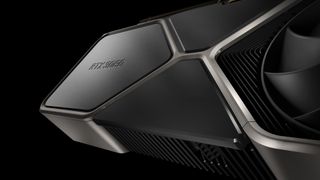EVGA confirms one cause of instability with RTX 3080 GPUs – but don’t jump to conclusions
Type of capacitor used is only one part of bigger design picture

The Nvidia GeForce RTX 3080 has not only been plagued by stock shortages since launch, but third-party models suffer from instability and crashing. And now graphics card manufacturer EVGA has come forward with some clarification on a possible cause.
A post by Igor’s Lab discusses the possibility that a certain type of capacitor (POSCAP) used on Nvidia graphics cards could be responsible for said crashes, and this ties in with a statement made by EVGA.
- Check out our in-depth Nvidia RTX 3080 review
- And these are all the best PC games
- We'll show you how to build a PC
EVGA noted in a post on its own forums: “During our mass production QC testing we discovered a full 6 POSCAPs solution cannot pass the real world applications testing. It took almost a week of R&D effort to find the cause and reduce the POSCAPs to 4 and add 20 MLCC caps prior to shipping production boards, this is why the EVGA GeForce RTX 3080 FTW3 series was delayed at launch.”
MLCC is a different type of capacitor, and both it and POSCAP have their own relative strengths and weaknesses. All you really need to know is that EVGA found an all-POSCAP solution unworkable, so switched to a mix of the two different types of capacitor with the final production hardware that hit shelves.
The suggestion which has quickly caught fire and spread online is that a full POSCAP loadout on a factory-overclocked third-party RTX 3080 card (Nvidia’s Founders Edition reportedly isn’t problematic) could mean trouble, and a graphics card that may suffer from the aforementioned crashing issues.
Note that the overclocking is a piece of the instability puzzle here, because as has already been observed, notching clock speeds down by 100MHz is a potential workaround that has worked for some (the crashes seems to occur when boost speeds are exceeding 2GHz).
Caution first
There are good reasons why we should be careful about trying to draw a conclusion that it’s foolish to buy an all-POSCAP RTX 3080 – a list of which has already appeared on Reddit.
Get daily insight, inspiration and deals in your inbox
Get the hottest deals available in your inbox plus news, reviews, opinion, analysis and more from the TechRadar team.
These capacitor problems may have a bearing on GPU stability, but picking out the type of capacitor in isolation isn't the full picture. The choice of power solution, design and other components used with the graphics card need to be considered, and the balance of parts is a more complex equation than simply saying ‘all-POSCAP = bad’.
That idea is backed up by Hardware Unboxed observing some crashing issues with the Asus TUF RTX 3080 – which uses all-MLCC, not even a mix – and a further suggestion on Reddit that the Gigabyte cards with all-POSCAP solutions aren’t problematic.
It seems we are a long way from pinning the real problem down. A sizeable part of the issue may be wrapped up in the lack of time that third-party graphics card makers allegedly had to design and manufacture the cards.
It’s a pretty safe bet that this is an Ampere controversy which is going to run for some time yet.
Via Tom's Hardware
Darren is a freelancer writing news and features for TechRadar (and occasionally T3) across a broad range of computing topics including CPUs, GPUs, various other hardware, VPNs, antivirus and more. He has written about tech for the best part of three decades, and writes books in his spare time (his debut novel - 'I Know What You Did Last Supper' - was published by Hachette UK in 2013).
